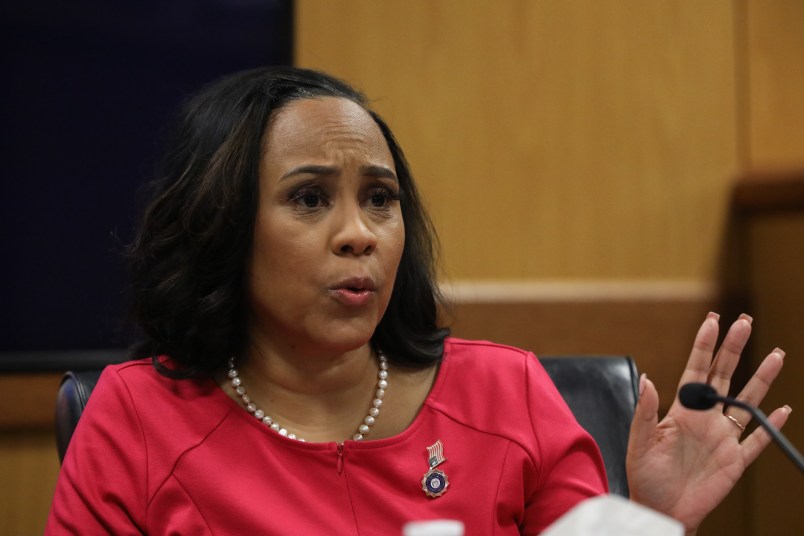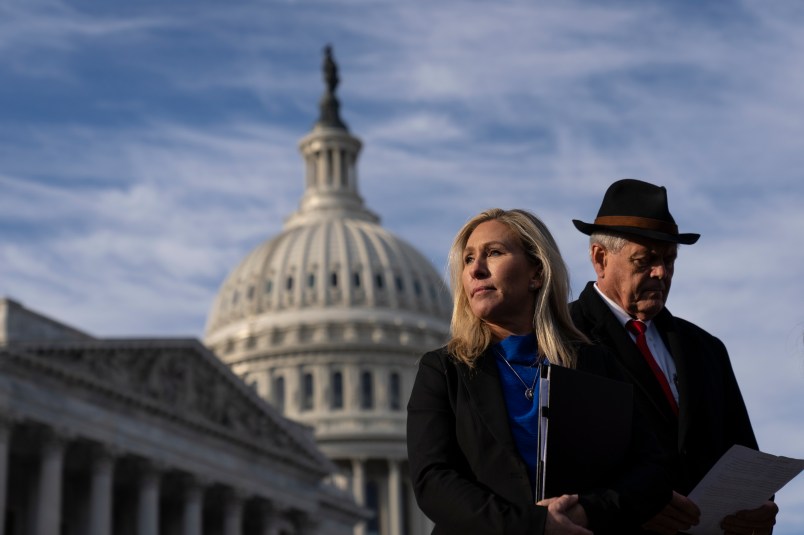The Office of the Vice President issued the following prepared remarks that Vice President Joe Biden delivered to the National Association Of Insurance Commissioners in Maryland today. Here’s the full text:
Thank you all very, very much. It’s so nice to be able to speak to an important person in New Hampshire and not have to ask for his vote. (Laughter.) I’ve spent many years in New Hampshire. It didn’t work very well, Rog. But it’s good to see you, man. I ask him how things are going in New Hampshire. He said, as well as anywhere. I wish I could have said that for my efforts. (Laughter.) It’s great to see you, pal.
And I looked out and speaking of — the lights — I can’t see. I’m going to miss some of them, I’m sure. But I see my insurance commissioner — Karen, how are you? And the probably leading proponent of health care in my state for the past 25 years — his father was a former congressman for over a decade in the ’60s who was back then calling for a health reform — Senator Harris McDowell. Harris, how are you doing, buddy? Great to see you.
As we say in my business, I hope you’ll pardon a point of personal privilege in my acknowledging the Delawareans I can see here. I’ve never seen so many damn insurance commissioners as I see today. (Laughter.) In my state, I’ve known every insurance commissioner for the past 38 years. And I want to tell you, you all play a really important job. You get the front-row seat not only in seeing how it works and doesn’t work, but in being the first line of intercession, complaint, concern, asking for help. And so I admire what you do and what you continue to do.
I’m really happy you’re here this week. Your input in the process is literally, not figuratively as I was saying to Roger in the back, is going to be key to the eventual success of health care reform. It’s no coincidence that our Secretary of Health and Human Services helping to lead the way on health care reform was a former colleague of yours, a former insurance commissioner.
You understand first-hand this crisis. You’ve seen the impact on families, and on businesses, of the skyrocketing insurance premiums. You’ve seen the pressure it places on hard-working Americans and on businesses, who in my view overwhelmingly want to do the right thing by their employees by providing health — decent health coverage, but are put in a really difficult spot.
And you’re working hard each and every day to combat these problems and to stop the unjustifiable increases in health care costs and insurance costs, I should say, in just as — just look at what you’ve been up against. I know you know it, but it’s important the public know it. A report released by the White House today finds that health insurance premiums in states have gone up between 90 and 150 percent in the last decade, far faster than wages and inflation.
From Alaska, where premiums increased 145 percent over that period, while wages grew just 35 percent to Florida, where premiums increased 121 percent, while wages increased 43 percent. And even in Michigan, which is being battered now as a consequence of this Great Recession, and Michigan, which was the best — where there was only a 37 percent gap between premium and wages is actually the smallest — but still a 37 percent gap.
All around the country — all around the country we’re seeing these gaps widen. And all in all, there was a 5.5 percent rise in premiums for families just this past year. During this Great Recession, when inflation actually fell [point] 7 percent. Inflation fell [point] 7 percent, and premiums increased 5.5 percent.
So the soaring premiums are not only hurting families and killing small businesses, they’re hurting our competitive position all around the world. But as the report points out, they’re hurting — they’re hurting our whole free enterprise system. They’re hurting our ability to compete — the business — of business competing internationally.
To make up for the higher premiums, you know what companies have to do. They either pass those premiums on to their employees, a larger share — they pass them on to their customers, making their products even less competitive. And again, during the recession they’ve had to do that, which puts American businesses at a distinct competitive disadvantage.
To state the obvious, this is simply an unsustainable position. Families, businesses, state budgets, our national economy — all demand a significant change. And you’re stuck in the middle of it all. You’re stuck in the middle of it all. You read the letters. You see the tears. The people — if it’s like my state of Delaware and a lot of small states, people actually importune you on the street. They know who you are. They know your job. They come up to you. I’ll bet you if I went around the room of insurance commissioners here, and ask you just to give me 10 stories, 10 stories you know first-hand from people literally approaching you — at your home, your neighborhood, the grocery store, the football game, church — it would be a literal saga. Well, it’s happening all across America.
You know the man with the heart condition whose company had been providing his health insurance went bankrupt. He loses his job. He loses his health insurance. He goes out to buy on his own, then he finds out he has a preexisting condition, making it virtually impossible, in any circumstance — but particularly in his desperate circumstance — being able to provide insurance for himself in the head of household. You know the woman who bought insurance, paid her premium for years, but had her coverage canceled, revoked for cancer treatments when she was told that she had her cancer before the policy was issued, even though she did not know she had it and it was not diagnosed until later.
You see. You all know that it isn’t just a crisis for people who don’t have insurance; it’s a crisis for many who do have insurance. And for many who have insurance, there is real genuine insecurity that they feel every day. I say to people most of us in this room have insurance, health insurance. Imagine being the young husband lying next to the wife carrying a child and knowing that if that baby is premature and I don’t have insurance, I lose my house. Think of the thousands or hundreds of circumstances you can name for me where it’s not just the physical exposure people have, not having insurance; it’s literally the mental stress that is placed upon them.
Look, we need some good ground rules to allow insurance companies. I want to get this clear. I want insurance companies to make money. I want insurance companies to be able to provide a return on their investment and their stockholders to benefit. I want them — continue to do their job and make a profit. But I also want them held accountable. I want to restore stability in our health care system. And there are basic ground rules we need right now. One, no discrimination for preexisting conditions; no exorbitant out-of-pocket expenses, deductible or copays; no cost sharing for preventive care; no dropping of coverage for the seriously ill; no gender discrimination; no annual lifetime caps on coverage — (applause) — extended coverage for young adults; guaranteed insurance renewal.
Look, we’ve been hearing a lot about our plan. And when I’m told, I turn on some of the cable shows or see some of the meetings — talking about how this isn’t free enterprise, and we’re against free enterprise and want to put insurance companies out of business. We’re going to destroy the companies. We’re going to destroy. And tomorrow I’m going to make a speech about — I’m going to go back and quote some of the things that were said when Medicare and Medicaid came into existence, the projections that were made.
Well, ladies and gentlemen, this is not going to spell the end of private insurance. It’s not going to kill competition. It’s not going to kill profits. The fact of the matter is what’s going to happen here, if every single company has to have those same guarantees, no company is at a political disadvantage — no company is at a political disadvantage. Right now a company that may want to do “the right thing” cannot “do the right thing,” because they’ll find themselves at a competitive disadvantage.
But if this is universally required of all those providing health insurance, there is no competitive disadvantage. I would argue that they talk about the fact that we’re also going to affect their profit margins. Well, the fact of the matter that we’re in a situation where instead, I argue, we are going to preserve competition. The ground rules don’t pick and choose which companies they apply to, they apply to everybody. The playing field is level. Every insurance company doing business in this country will have to pay — play by the same basic rules. The competition will stay healthy.
Others say that we’re killing the bottom line, destroying profits. To them I say first, insurance companies may not be able to drop some of the most costly patients anymore, but when every American — every American has health insurance, they will have up to tens of millions of new customers, probably in the order of 30 to 40 million new customers, a significant portion of whom are healthy and young and inexpensive to cover their cost. So the profits might not be as high per person they cover, but there will be a much larger pool of paying customers.
And far from running insurance companies out of business, we will be building the best thing about today’s — building on the best things about today’s system, with more competition, more choice for customers — and for the insurance companies, more customers, paying customers.
So when our critics say — the third argument I hear is they say, well, this is not a moral issue. And some of us say there is a moral component to this. Well, tell that to the father who is fighting cancer and is told that his insurance won’t cover any more treatment, because he’s reached the annual limits. Tell that to a little girl who is in a full body cast, requires speech and physical therapy to recover only to be denied coverage for that therapy because it’s deemed “maintenance” rather than “recovery.” I could go to you and you could give me 25 other stories about why this is and does have a moral component to it. Or the mother with a diabetic child who is trying to cover the cost of insulin her child needs just to stay alive.
You know what I’m talking about. You’ve looked into the eyes of that parent, fighting like hell to find a way to take care of a sick child and afford it. And I know it’s had to cross your mind as well as mine — whether you’re a Democrat, or a Republican, or an independent. How can we live in a country where this is even possible?
So there’s got to be a solution. Now, I’m confident that the one we are proposing is just the solution we need. But let’s face it. Let’s face it, there’s a dire need to make this work. According to a stark report issued last week at Harvard University, as many as 45,000 people per year die owing to a lack of health insurance — 45,000 individuals, according to a Harvard study. How is that possible?
I’m sure you realize when you swap your war stories, none of you are immune. The crisis reaches into every one of your states. But I think you also realize that the large growth in premiums across the states over the last decade underscores the need for a nationwide solution. You do what you can, but too often you don’t have the authority, you run into legal limits; you’re up against major consolidation of insurance markets in your state, giving you very little choices.
Let’s put this debate in perspective, and it’s legitimate to debate many of the aspects of our proposal. That’s a legitimate debate. There may be a better way arguably than what we’re suggesting. We think it’s the best way. But one thing there is no debate about, none, and that is what will happen to the economy and the system if we do not fundamentally change the system. How many people in here think the status quo ante is all right? That we need do nothing consequential in the next months and year?
If we do nothing, in 10 years one in every $5 Americans earn will be spent on health care; in 30 years, one out of every $3 will be spent on health care if we do not bend the cost curve. Spending by the federal government on Medicare and Medicaid alone will be 15 percent of GDP by 2040 — it’s now about 5 percent. Right now about 46 percent of health care is government funded through Medicare and Medicaid.
I had a woman come up to me, God love her — a friend — to say, Joe, I want the federal government keeping your hands off of my Medicare. (Laughter.) I’ll bet you’ve had a similar experience. Don’t touch my Medicare. Keep the government out. Okay, I mean — (laughter) — I said, well, do you know that Medicare is a federal program, federally funded? I don’t care; just keep your hands off it. (Laughter.)
And you think I’m joking. The insurance commissioners know I’m not joking. You know I’m not kidding. People don’t understand — 46 cents out of every dollar for health care is paid for by the federal government now — taxpayers. And if we do nothing, health care costs to the federal budget, which are now 20 percent of the budget, are going to swallow the entire budget. We’ll eventually spend more on Medicare and Medicaid than all other government programs combined.
So when the President says we have to bend that cost curve, that’s what he’s talking about. I got criticized for saying we have to do something — like businesses, you got to spend money to make money. If we don’t change the system, there is no reasonable prospect we can get our fiscal house in order. The President is right. We can’t get our fiscal house in order without bending the cost curve back so that instead of spending close to 15 percent of the GDP on Medicare and Medicaid, we’re spending closer to the current levels of 5 or 6 percent. We just can’t. It’s literally that simple. It’s irrefutable.
Now, I know this has been a loud and contentious debate. Just look at some of the town meetings. But the truth is we have never been this close to real reform ever, since Harry Truman first raised the issue. I’ve been a United States senator. I was elected seven terms. I’ve been Vice President now about eight months. I have never seen so much consensus on so many major parts of a reform plan in my entire public life.
Every single committee has passed on or is acting on health care legislation — the Finance Committee is marking up today. There’s broad agreement on roughly 80 to 85 percent of all the major elements of any health care reform proposal, even groups who have led the argument against doing anything about repairing the system, even groups who have been skeptical of reform in the past see the need. Doctors’ organizations, nurses’ organizations, hospitals’ organizations, drug companies — they all support significant reform. And the traditional groups like seniors and labor unions and others, they continue to support reform. And of course there is you, the insurance commissioners.
I’ve read your statements. You support reform. I’m not tying you into our plan or any specific plan. But you know there’s no — this is no time to tinker. You can’t rearrange the deck chairs on the Titanic. We got to change ships here.
You support reform. You’ve said it in your health care reform principles. You said we need to protect consumers and increase the affordability and access to insurance. You all get it. You know better than almost anyone about the inefficiencies, the cost shifting — the bad practices that presently corrode our health care system. You know these reforms will only serve to strengthen the vital work that you do each and every day. You’re the best equipped to educate consumers. You are the best equipped to field complaints. You’re the best equipped to serve as a critical line of defense against the abuse and fraud that had crushed families, crushed businesses, and crushed the dreams of millions of Americans. And you’ll remain so.
Folks, the problem is real. The need for reform is acute, and the time is now. The poet Virgil once said the greatest wealth is health. The greatest wealth is health. Well, we’re here to improve America’s health, and in the process not incidentally secure and maintain America’s wealth. They are not separable.
Ladies and gentlemen, we cannot get through these contentious and justifiably debatable issues on the margins without you. You’re the people that our people look to. So I want to thank you for being here at this moment. I want to thank you for your organization’s profession of support for the need to make health care more affordable, accessible, and engage in reform, because you are the most influential people in our states to deal with this.
So thank you again, and may God bless you. May God bless America, and may he protect our troops. Thank you all very much. (Applause.)









